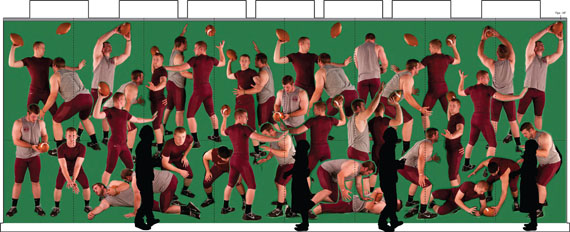
A rendering of Playbook, a large-scale mural that Mark Robbins ’77 created for his Strong and Silent exhibition in Colgate’s Clifford Gallery
Returning to campus earlier this month to install his exhibition titled Strong and Silent, artist and photographer Mark Robbins ’77 could see clearly how his artistic growth began at Colgate.
Explaining the earliest work in the show — three short experimental films Robbins made as a student — he said: “They have to do with issues relating to gender roles, and the sports ethos and male ethos at Colgate, which was still predominantly male when I was a student. I found the atmosphere helpful with my creative work. Those themes, and the ideas discussed in my liberal arts classes, still inspire my work today.”
“[The exhibition] reflects broadly on Mark’s interests in history and fiction, in the figure and style, and in social order and decorum,” said art and art history professor Linn Underhill.
Strong and Silent, which runs through October 14 in Clifford Gallery, looks retrospectively at the evolution of Robbins’s portfolio, highlighting artwork he produced as a student as well as his more recent pieces. Until recently, Robbins was the dean of the Syracuse University School of Architecture, but he’s taken a position as the executive director of the international Center of Photography in New York City.
In Playbook, a new large-scale mural created for this exhibition, he places contemporary Colgate football players within the iconographic space of classical friezes. In close proximity, viewers find photographs of neo-classical male sculptures, which portray the theme of the masculine form and the body in motion as a “kind of choreography.”
Robbins gave a lecture about his work preceding the opening reception for the exhibition on September 5. There, Riana Lum ’13, a student in Professor Lynn Schwarzer’s ARTS 405: Issues in Recent Art class, asked about the Playbook mural, which was set tightly opposite a wall where viewers could stand. Lum wanted to know why Robbins created such a small distance for the audience to take in the expansive mural. In response, Robbins reflected on how a person is affected by space and how we alter and create atmospheres.
“His setup of the exhibition further emphasizes this by really forcing the viewer to interact with the artwork,” Lum said.